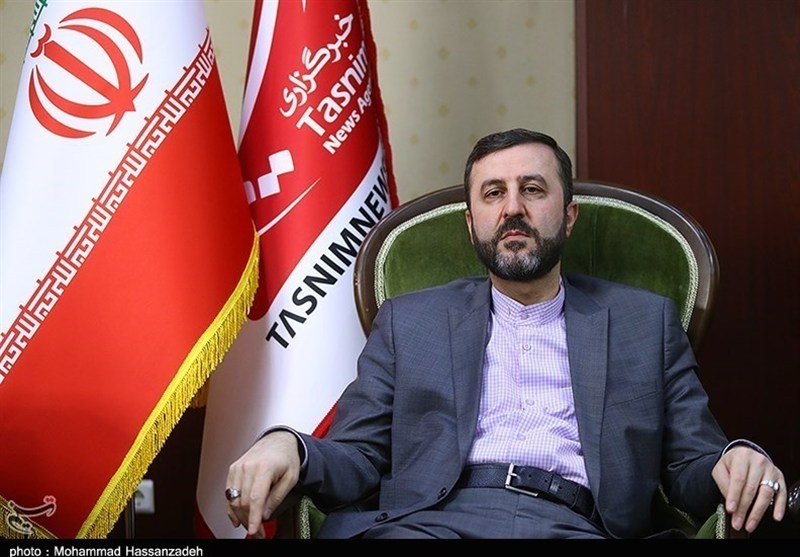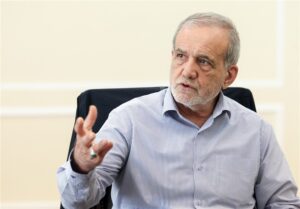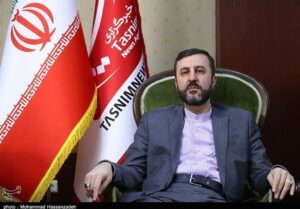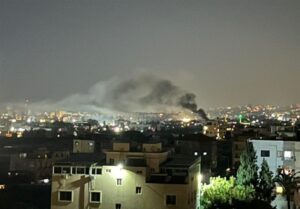According to Tasnim news agency, the first meeting of the governors of the coastal provinces of the countries bordering the Caspian Sea with the slogan “Caspian, a bridge of friendship and regional development” started on the morning of Tuesday, November 27, with the presence of high-ranking domestic and foreign officials in Rasht.
This two-day summit, initiated by the Islamic Republic of Iran and with the aim of strengthening regional cooperation, increasing economic interactions and coordination in the field of sustainable development and environmental protection in the world’s largest closed water area, hosts delegations from 9 foreign regions and five Iranian provinces.
Kazem Gharibabadi, Deputy Legal and International Affairs of the Ministry of Foreign Affairs, while attending a special news interview program on Tuesday evening, referring to the importance of holding this summit, said: A conference was held in Bahman last year at the level of the prime ministers, and it was decided that the next meeting will be held in Rasht. Extensive planning was prepared for it, and lobbies and consultations were also held with the four coastal countries. The topics that were put on the agenda; We should note that regionalism is one discussion and paying attention to neighboring countries is another. Now, in the discussion of neighbors, our gaze is focused on the same policy of regionalism; We have started from the Caspian region. Caspian coastal countries have very wide capacities, and the most important thing is that we have very good relations with the four coastal countries. Of course, this does not mean ignoring other countries in Central Asia or the Caucasus. We have active cooperation with other countries in this region.
There are various capacities in the Caspian basin
He continued: The proposed Eurasian Economic Union includes more countries and even includes some countries outside this geographical area. We are also active in that framework, we are members and we use its regional capacities. However, the current focus is on the Caspian Basin; Because this field has diverse capacities in environmental cooperation, tourism, transportation and logistics, and economic and commercial cooperation. The discussion of the North-South Corridor, which is also discussed these days, naturally involves three main countries, namely Iran, Azerbaijan and Russia, which includes the coastal countries and is of strategic importance. The main goal of this meeting is to be able to connect a road map to connect our provinces and then follow up on its approval until it reaches the implementation stage.
The success of neighborhood diplomacy depends on the dynamics of provincial diplomacy
Pointing out that a secretariat has been established in the Ministry of Foreign Affairs and in the Consular Vice-Chancellor, Parliamentary Affairs and Iranians Abroad, which Mr. Dr. Jalalzadeh is responsible for, he said: Naturally, this process will not be limited to these two or three meetings, and it is possible that the next meetings will be held in different provinces that have the capacity. The important point in provincial diplomacy is that the provinces must first believe in their capacities. If there is no driving force within the country, neighborhood diplomacy and cooperation with neighboring countries will not be formed; Therefore, we must first create its corresponding structure inside the country. For this reason, the Ministry of Foreign Affairs has paid attention to this issue.
Foreign policy is not just about talking with a few countries
Gharib Abadi emphasizing that our goal is not to do work inside the country; He added: The goal is to identify the domestic capacities and connect them to the capacities and mechanisms outside the country, especially the surrounding countries and neighbors, so that they can be exploited in line with national interests. Foreign policy is not just about talking with a few countries. Dialogue and negotiation are only part of the duties of the Ministry of Foreign Affairs. The Ministry of Foreign Affairs also has other duties, including missions in the field of economic diplomacy. We believe that the outcome of the activities of the Ministry of Foreign Affairs should be to secure national interests; Providing national interests is not limited to political, diplomatic or security-defense interests. An important part of that, in today’s vastly interconnected world, is economic and business interests, which are very key.
The strongest diplomats should be sent as ambassadors to neighboring countries
The Legal Deputy Minister of Foreign Affairs pointed out: From this point of view, the Ministry of Foreign Affairs is revising its structures to use all internal capacities, provincial capacities, and the capacity of embassies to realize national interests. One of the ideas that is being pursued in the Ministry of Foreign Affairs is changing the approach towards embassies. At one time, special attention was paid to the embassies of European countries and efforts were made to send strong ambassadors and diplomats to those countries. But today there is no need for this approach. The Ministry of Foreign Affairs is now working on the idea that the strongest diplomats should be sent as ambassadors to neighboring countries, and this issue is of special concern to the Honorable Minister of Foreign Affairs. We are currently trying to strengthen the structure and human resources of our embassies in neighboring countries.
Planning for the President’s visit to Kazakhstan and Turkmenistan
Gharibabadi said in the continuation of this news program: For example, consider the Caspian region. In the Ministry of Foreign Affairs, which is part of the government and in a broader sense part of the structure of the Islamic Republic of Iran, we provide the ground for the exploitation of the executive, economic and commercial sectors in this field. The meetings that are being held now are an example of these platforms. We are planning for the summit of Caspian countries in August of next year in Tehran; It means that the heads of four other countries should come to Tehran, the preparations of which are underway. At this very moment that I am talking to you, the president’s visit to two countries from the same area, namely Kazakhstan and Turkmenistan, is planned in the next month.
He continued: What we expect from executive bodies is to use these ready platforms; Go to their counterparts in different countries and take advantage of cooperation opportunities at the provincial level. Now a good platform has been provided and every governorate within the country, not only in the area of peripheral countries, but even with the provinces of distant countries, can take action to exchange experience, take advantage of capacities and conclude cooperation agreements. The Ministry of Foreign Affairs provides the utmost assistance, encourages and follows up on this process.
The main task of the Ministry of Foreign Affairs in the field of economic diplomacy is to provide platforms
The Legal Deputy Minister of Foreign Affairs continued: In this same meeting, our ambassadors in four countries and two consuls general from surrounding provinces have been invited to be present, to see the trends closely and to be able to help the public sector and the private sector. Our main work is to provide platforms; Helping related executive departments and the private sector. As far as communication between provincial officials is concerned, there are no restrictions in the Ministry of Foreign Affairs. The reason is that such relations are not of macro foreign policy or security and defense issues that require special restrictions. If a governor wants to meet with the governor of another country or sign a cooperation memorandum.
Pointing out that one of our main duties in the foreign field is to create coordination, Gharib Abadi noted: For example, if a project is defined between an Iranian province and a province in a neighboring country, it should be determined whether this project is necessary for the country or not; Whether executive bodies at a higher level support it or not. These are issues that the Ministry of Foreign Affairs is responsible for coordinating; It organizes coordination meetings, obtains the opinion of various institutions and tries to provide the necessary consensus and integrity to support cooperation both with countries and especially with neighboring provinces. Even now, there is this synergy between the Ministry of Foreign Affairs and executive bodies at a high level.
The existing capacities in Shanghai, BRICS and ECO are key
Pointing out that the ECO Secretariat is based in Tehran, the deputy foreign minister said: We now have the Shanghai Cooperation Organization and BRICS. Mr. Dr. Aref, the honorable first deputy, returned from Moscow this evening and the meeting of the prime ministers of Shanghai was held. Various documents were signed and about 10 to 12 proposals of Iran were included in the final statement. Inside the country, we have formed a coordination headquarters for the same Shanghai Cooperation Organization, and we are coordinating with the presence of representatives of more than 60 or 65 executive bodies in order to determine how the capacities of Shanghai and BRICS can be used in line with national interests. This is very key.
He continued: We have capacities in some neighboring countries and at other levels, in the area of Shanghai, BRICS and ECO, which are very key. In the same area of Shanghai and BRICS, we have encouraged some executive bodies to cooperate with these countries bilaterally.
Most of the countries do not support the return of Security Council sanctions against Iran
Gharib Abadi noted: Now that we are talking about sanctions and it is mentioned that “Snapback” is back, which Snapback should be seen? Basically, the snapback that has been implemented is not supported by the countries. On the other hand, many cooperations that are being formed, even if we assume that the terminated resolutions of the Security Council are also returned, are not prohibited according to them. One of the missions we have given to our embassies is that if a country has reservations, our ambassadors should talk to the authorities of that country to make it clear that even if they want to comply with sanctions that are basically illegal, these activities that we intend to carry out are not sanctions at all. Therefore, clarifying and using the capacities is very important and this work is being done.
He continued: We have encouraged the executive bodies to cooperate with the member countries of Shanghai and BRICS bilaterally and define a project. Just yesterday, we had a meeting with one of the executive bodies about the three countries and the Shanghai region, and they have several very important projects. We have also encouraged them and are coordinating so that they can cooperate with these countries.
The West thought that it could put heavy pressure on Iran with Snapback
Pointing out that the policies pursued by the US and three European countries towards Iran in less than a year, Gharibabadi added: “It seems that they have reached the same conclusion little by little.” These countries thought that with measures such as the activation of Snapback, they could put heavy pressure on Iran and maybe they could force Tehran to back down in the area of dialogue and negotiation. We warned them that this is not a good tool for them; This is their last shot and if they spend it, what else will they have to discuss with Iran. They did not pay attention.
Iran had presented good plans for interaction
The deputy foreign minister pointed out that Iran has good plans for interaction and dialogue, especially on the sidelines of the UN General Assembly meeting; He said: but those proposals were ignored. For the first time in the Security Council itself, we witnessed a split; The international community did not cooperate. Russia and China also opposed with very serious and principled positions. Inside the country, executive and economic institutions tried to control the effects of pressure on people’s livelihood. Of course, these pressures were not ineffective, but they did not come true as the Westerners predicted. I must even say that we had internal meetings before Snapback was activated, and the predictions of the responsible authorities about the possible effects were much heavier than what we see now. This shows that we controlled a significant part of the works.
Iran is still strong, stable and enjoys the support of the people and domestic public opinion
Gharib Abadi pointed out: The same situation also applies to the agency’s possible actions or resolutions. The same is true for America. Finally, the American regime and the Zionist regime started aggression against the Islamic Republic. What was the result? Were they able to defeat Iran? No; The main defeat was theirs. They accept this now. The issue is not that we want to say “we won and they lost”, but the fact is that they did not achieve any of their strategic goals. The Islamic Republic of Iran was also able to deal heavy blows to the Zionist regime. Did they achieve their goals with a military attack? no Iran is still strong, stable and enjoys the support of the people and domestic public opinion. In my opinion, these countries are forced to change their approaches. If they want to continue the same policies as before, they will not make progress.
We do not need to negotiate confidentially with the agency
The deputy foreign minister pointed out: sometimes some signals that are heard from them are caused by this; Maybe it is a sign of a little bit of rationality to see that their past approaches regarding Iran did not work and they should move towards interacting and exploiting more constructive approaches. We have a relationship with the IAEA and we don’t need to have confidential negotiations, but it is natural that the actions taken by the three countries and the United States in the context of the resolution against Iran will make the understandings we had with the IAEA be practically abandoned.
end of message/
منبع:تسنیم







